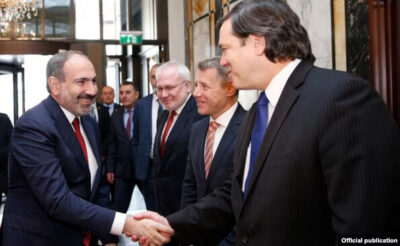By Edmond Y. Azadian
During the Karabagh war, the ragtag Armenian armed forces scored a historic victory against overwhelming Azeri forces and liberated a piece of Armenian territory long languishing under Azeri misrule. That victory was achieved because morale was high and the Armenian soldiers were inspired. After a tenuous ceasefire, Armenia and Karabagh were engaged in state building, which included a swift organization of their armed forces, because a no-war, no-peace period had ensued, following that cease-fire, which kept everyone on their toes.
Today we are being reassured that the Armenian armed forces possess the necessary military technology and the man power to defend Armenia against possible Azeri aggression, despite Baku’s military build up through its Petrodollars. We are being further reassured that Azerbaijan would have already attacked Armenia — making good on its threats — had it not been deterred by the might and combat-readiness of the Armenian armed forces.
Despite all these assurances, there are some disquieting incidents in the armed forces, which undermine the morale of the servicemen; these are the alarming number of peacetime deaths in the army. Although the figures vary, nonetheless they are troubling.
It is said that the army reflects the image of the civil society. If that is true, in Armenia’s case there is some healing to be done within the army.
The corruption in the army was well known and bearable until unexplained deaths began to increase. The recruiting officers have always had lucrative positions to give dispensation to any recruit for a price. Additionally, normal furloughs and discharges were allowed through bribes, which certainly found their way into the higher echelons of the army. There is no way to uproot this kind of corruption, because that corruption is committed by the same officers tasked with guaranteeing discipline in the army and keeping the hands of leadership clean. It was a way of life society tolerated, though with a degree of resentment. Now, however, the increasing number of the deaths has alarmed the families and society as a whole. The army brass is under pressure by human rights groups to do some explaining.







